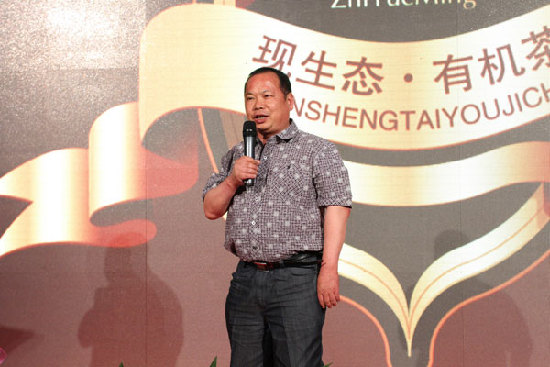Organic tea merchant looks to boost his brand
- By Zhang Yunxing
 0 Comment(s)
0 Comment(s) Print
Print E-mail China.org.cn, May 10, 2012
E-mail China.org.cn, May 10, 2012
Ceng Desong stands by a simple philosophy: Happy famers grow tea of high quality, and high quality tea deserves high price. But the long-time tea merchant is worried that the opposite is prevailing in today's market.
Tea farmers in his hometown of Guizhou Province produce one of the best green tea in the world but remain poor, and people living in big cities find it difficult to buy quality, organic tea even while paying a high price.
 |
|
Standing by the principle of high quality tea deserves high price, Ceng Desong has helped local farmers triple tea prices by establishing the Zhiyueming brand. [China.org.cn] |
"Inconvenient traffic due to mountainous terrain, lack of information and a powerful brand make it hard for tea farmers in Guizhou to escape poverty," Ceng said at a ceremony Wednesday celebrating the Zhiyueming early spring tea, freshly harvested and minted for the market in Beijing.
Despite his small stature, Ceng, 45, is called a "giant" by tea famers at home. In 2009, Ceng established the brand Zhiyueming for his hometown tea. In just two years, the brand helped to triple the purchase price of raw tea leaves from 50 yuan in 2010 to 150 yuan this year, while it is still struggling to build itself to a high-end tea brand.
A high purchase price brings hope to many tea farmers. Zhang Qilong from Pingyang Village in Duyun City has been growing tea for 20 years and, before 2010, could barely make ends meet. "I was desperate and was about to give up the tea business," Zhang said at the ceremony. He said he could now earn up to 20,000 yuan a year. "The income is still low, but much better than before."
"Helping tea farmers get rich is also part of my job," said Ceng, who is also a village official. He said his next mission is to present his organic green tea to a bigger market – he wants to build a real brand. "Without a powerful brand, high quality tea produced in Guizhou can only be sold to brand tea dealers for raw material."
Ceng said he was very confident of his green tea. He said the Zhiyueming tea is completely free of pesticide and fertilizer, and the processing is entirely by hand. He said some famous brands' dishonesty has hurt the tea industry.
Greenpeace randomly purchased and tested the tea products of nine famous Chinese tea brands last December and in January earlier this year. The results indicated that 12 of the products contained pesticide residue, including methomyl and endosulfan, which are prohibited from use in food products.






Go to Forum >>0 Comment(s)